The Health bulletin [serial] - University of North Carolina at Chapel Hill
The Health bulletin [serial] - University of North Carolina at Chapel Hill
The Health bulletin [serial] - University of North Carolina at Chapel Hill
You also want an ePaper? Increase the reach of your titles
YUMPU automatically turns print PDFs into web optimized ePapers that Google loves.
January, 1955 <strong>The</strong> <strong>Health</strong> Bulletin 15the cause <strong>of</strong> health improvement. Wecan protest, and can recommend—andwe should. We should study our problemas a farmer does his land and decidewhich fields would best be plowedand which can most pr<strong>of</strong>itably be leftfallow. We can and should take thepublic and public <strong>of</strong>ficials, includinglegisl<strong>at</strong>ors, into our confidence andask for their help in planning; but weshould be frank with them and resistthe tendency to favor always the popularand expedient course.It seems to me, though, th<strong>at</strong> weshould agree on some basic action forthe future. We must recognize thefact th<strong>at</strong> our job in public health haschanged and is changing and will continueto change. We should recognizethe fact th<strong>at</strong> past successes do notjustify our present and future existence.We should not exagger<strong>at</strong>e ourpast contributions, but, on the otherhand, we should emphasize the possibilitiesfor effective work in the future.We must realize th<strong>at</strong> the work ahead<strong>of</strong> us may not be so dram<strong>at</strong>ic as th<strong>at</strong>in the past. We must reconsider ourformer major objective <strong>of</strong> reducingmortality from specific diseases andcauses, such as pellagra, diphtheriaand the like. Our present objectivesshould include holding the line againstthe return <strong>of</strong> these diseases th<strong>at</strong> havebecome minor public health problemsand shift gradually to a program <strong>of</strong>general health conserv<strong>at</strong>ion. Helpingpeople to stay out <strong>of</strong> the hospital, tolead more vigorous and longer livesand to maintain a better mental andemotional balance may not be sospectacular, but it is the job, as Isee it, th<strong>at</strong> remains for public healthto do in the future. We will find ourselvesdoing more and more to makeliving conditions pleasant and enjoyable.For example, we are alreadyspending sums <strong>of</strong> money in Florida tocomb<strong>at</strong> pest mosquitoes, as distinguishedfrom disease-bearing mosquitoes. Weare paying more <strong>at</strong>tention to publicw<strong>at</strong>er supplies which have had tastesand odors or which discolor laundryor clog pipes. Industrial plants whichgive <strong>of</strong>f unpleasant odors or dust areinvestig<strong>at</strong>ed. We are beginning to learnth<strong>at</strong> to be healthy physically, mentallyand emotionally, we must be happy andcontented where we live.Our criteria for selecting programs<strong>of</strong> the future should be based notonly on preventing illness and savinglives but also on the newer theoryth<strong>at</strong> they promote health andphysical and mental well-being. Suchprograms as those concerned withchronic diseases (cancer, heart diseaseand diabetes) and mental and emotionaldisturbances, including alcoholism,will be promoted in the yearsto come. In the field <strong>of</strong> environmentalsanit<strong>at</strong>ion, pest mosquito control, <strong>at</strong>mosphericpollution, stream pollutionand control <strong>of</strong> allergy-producing substances,I feel will be important. Manyother problems, now unthought <strong>of</strong>, willcome to the fore and occupy our mindsin the next few years. But I haveenumer<strong>at</strong>ed enough to keep all <strong>of</strong> usbusy for quite a while.NOTES AND COMMENTBY THE EDITORTHE GENERAL PRACTITIONER'SAWARD*At the annual Clinical Meeting <strong>of</strong>the American Medical Associ<strong>at</strong>ion inMiami, Fla., Nov. 29, 1954, the annualEditorial. Vol. 156,Dec. 11. 1954.No. 15. J.A.M.A.General Practitioner's Award, consisting<strong>of</strong> a gold medal and a cit<strong>at</strong>ion wasgiven to Dr. Karl B. Pace, who haspracticed medicine in Greenville, N. C.for nearly 40 years except for his militaryservice in World War I. <strong>The</strong>selection <strong>of</strong> Dr. Pace as the typicalfamily doctor <strong>of</strong> 1954 was announced<strong>at</strong> the opening session <strong>of</strong> the House


![The Health bulletin [serial] - University of North Carolina at Chapel Hill](https://img.yumpu.com/43204263/21/500x640/the-health-bulletin-serial-university-of-north-carolina-at-chapel-hill.jpg)
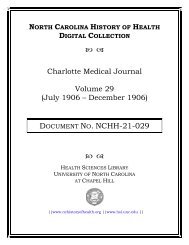
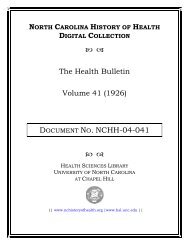
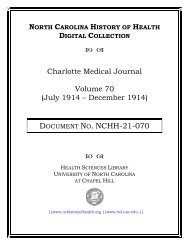
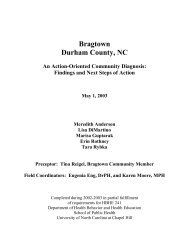
![Bulletin of the North Carolina Board of Health [serial] - University of ...](https://img.yumpu.com/48032016/1/153x260/bulletin-of-the-north-carolina-board-of-health-serial-university-of-.jpg?quality=85)
![The Health bulletin [serial] - University of North Carolina at Chapel Hill](https://img.yumpu.com/47603625/1/169x260/the-health-bulletin-serial-university-of-north-carolina-at-chapel-hill.jpg?quality=85)
![The Health bulletin [serial] - University of North Carolina at Chapel Hill](https://img.yumpu.com/47242858/1/169x260/the-health-bulletin-serial-university-of-north-carolina-at-chapel-hill.jpg?quality=85)
![The Health bulletin [serial] - University of North Carolina at Chapel Hill](https://img.yumpu.com/41981074/1/163x260/the-health-bulletin-serial-university-of-north-carolina-at-chapel-hill.jpg?quality=85)
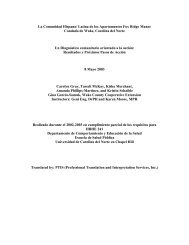
![The Health bulletin [serial] - University of North Carolina at Chapel Hill](https://img.yumpu.com/40912928/1/164x260/the-health-bulletin-serial-university-of-north-carolina-at-chapel-hill.jpg?quality=85)
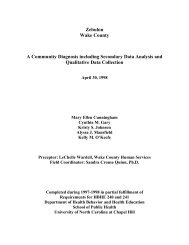
![The Health bulletin [serial] - University of North Carolina at Chapel Hill](https://img.yumpu.com/35643061/1/167x260/the-health-bulletin-serial-university-of-north-carolina-at-chapel-hill.jpg?quality=85)
![Biennial report of the North Carolina State Board of Health [serial]](https://img.yumpu.com/34024350/1/166x260/biennial-report-of-the-north-carolina-state-board-of-health-serial.jpg?quality=85)
